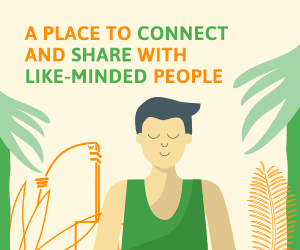Instead of striving for happiness through end goals or objects, try cultivating day-to-day well-being. Because, as Calvin Holbrook explains, science shows that happiness really is a journey and not a destination.
'Happiness is a journey, not a destination’ is an often-heard saying, and many people would argue that the search for well-being is the greatest motivator of all humankind. But does this motto really hold true? And what does science have to say on the subject?
The expression suggests that humans shouldn’t believe that reaching a certain life goal will award them with happiness. The destination in question could be one of numerous end-points we're often striving for in life: that dream job, buying a first home, meeting the perfect partner, or snagging that huge pay rise you've been working so hard for.
RELATED: Money Can't Buy Happiness (Except When You Spend It Like This!)
Chances are if you do reach one of your destination life goals, you may indeed feel happier – but only temporarily. Why? Because of our happiness set-point.
Happiness journey vs destination: set-point
One theory in happiness research puts forward that humans have a so-called happiness ‘set-point’. According to psychologist Sonja Lyubomirsky, this genetic set-point makes up about 50 per cent of our happiness levels – the rest coming from our circumstances and how we live life.
Enjoy the ride: happiness is a journey, not destination. shutterstock
Our set-point largely determines our overall well-being, and all of us have different levels. Therefore, those with higher set-points will be happier most of the time compared with those that have a less joyful outlook (due to their lower set-point).
Going through our life journey, we oscillate around this set-point. Unhappy life events shift happiness levels below their set-point while positive or exciting events boost your happiness levels above it.
RELATED: Is Happiness Genetic?
However, sooner or later, when that event becomes normalized or changes, happiness levels return to the original set-point (for example, when we feel the 'holiday blues' after coming back from the high of a recent holiday).
Likewise, once you reach your supposed happiness destination, it may not last, or something may get in the way of the perceived happiness you thought it would bring. For example, after getting what you thought was your dream job, you actually discovered it brought you a lot of negative stress due to the additional workload (and your demanding new boss). That dream new apartment you bought? Well, the noisy neighbours upstairs are doing their best to destroy your peace. Just met your 'perfect' partner? You'll soon discover all the things about them that drive you up the wall! Well, you get the picture.
“Chances are if you do reach one of your destination life goals, you will indeed feel happier – but only temporarily.”
Additionally, at some point these final destinations may dissolve all together. Indeed, as the only consistent thing in life is change, believing that happiness is a destination rather than the journey itself makes little sense. In fact, this pursuit of happiness – the constant desire and drive to achieve things we believe will boost our well-being and joy – often ends in disappointment (the so-called ‘happiness trap’. ) Overcoming disappointment is a challenge in itself.
Improving your journey to happiness
As discussed, according to Lyubomirsky, our genetic set-point is responsible for around 50 per cent of our happiness. The remainder depends on our circumstances (10 per cent ) and our life activity (40 per cent).
However, some studies suggest that by changing our day-to-day life activity – focusing on our journey and not a final destination – we can boost our internal set-point to a higher level and become happier. Indeed, there are many smaller, everyday activities we can choose to improve our general well-being. So, here are five that you can employ right away.
1. Be kind
Studies show we can fix our happiness set point higher by helping others. In fact, according to one — analyzing data from the German Socio-Economic Panel Survey – the trait most strongly linked to long-term happiness increases is a regular commitment to altruism. It showed that the more compassionate we are, the happier our life journey seems to be.
RELATED: The Benefits of Kindness
This was backed up by another study by Sonja Lyubomirsky published in the Review of General Psychology in 2005. When she had students perform five weekly acts of kindness over a period of six weeks, they noticed a significant increase in happiness levels compared to a control group of students.
2. Practise gratitude
Cultivating gratitude is scientifically-proven to increase your happiness journey, and is one of the simplest life changes you can make as it requires little effort.
“As the only consistent thing in life is change, believing that happiness is a destination rather than the journey really makes little sense.”
According to a 2003 report in the journal of Social Behavior and Personality, grateful people tend to appreciate simple pleasures (defined as "those pleasures in life that are available to most people”). Indeed, a study published in The Journal of Happiness Studies showed that writing a daily or weekly gratitude journal can make finding happiness easier.
3. Meditate
Starting your day with just five to 10 minutes of meditation will help you to develop your happiness. Try meditating in the morning shortly after waking: the immediate heightened inner clarity it will give you will set you up for the rest of the day.
In fact, the benefits of meditation are many. There are numerous studies that show that it can boost happiness levels by reducing stress hormones, shrinking the part of the brain that controls anxiety, and by stopping rumination, amongst other things. 
Inner focus: meditation will help your happiness journey
And, according to Psychology Today, meditation is the strongest mental practice that has the power to reset your happiness set point, thus turning you into a more joyful person: regular meditation practice can literally rewire your brain so you can become happier.
4. Build quality relationships
If happiness is a journey and not a destination, then it’s the people that are with you on your journey that can make all the difference. Science is clear on this: you can find and maintain happiness through developing quality relationships.
Humans are a social species and need regular contact. In a 75-year, multigenerational study, Robert Waldinger measured happiness levels in people from Boston’s poorest neighborhoods. He found that the most joyful were those with high-quality social connections.
5. Choose happiness
Bronnie Ware, a palliative care nurse who devoted her career to working with end-of-life patients, found a theme in those coming to the end of their lives: they has a deep regret about not ‘letting’ themselves be happy. Ware, the author of The Top Five Regrets Of The Dying, penned a blog for the Huffington Post, in which she wrote:
“Many did not realize until the end that happiness is a choice. They had stayed stuck in old patterns and habits. The so-called 'comfort' of familiarity overflowed into their emotions, as well as their physical lives.
“Fear of change had them pretending to others, and to their selves, that they were content. When deep within, they longed to laugh properly and have silliness in their life again ... Life is a choice. It is your life. Choose consciously, choose wisely, choose honestly. Choose happiness.”
RELATED: Cherophobia: the Fear of Happiness Explained
The takeaway: happiness is a journey
All to often we are led to believe that by obtaining goals or possessions we will feel happier. But the reality is – and science agrees – that when we reach those destinations, our happiness levels quickly return to their original set-point. Indeed, happiness often leads to success, but success does not always lead to happiness.
Instead, research shows that the best way to maintain consistent well-being is to focus on the everyday changes you can make in your life, with altruism, gratitude and quality relationships being important factors: happiness really is a journey and not a destination. And when life gives you lemons, make lemonade!
In fact, research in the field of positive psychology has shown that happiness is a choice that anyone can make. As psychologist William James put it, “The greatest discovery of any generation is that a human can alter his life by altering his attitude.” ●
Main image: shutterstock/Olga Danylenko
happiness.com | The fine art of being: learn, practise, share
Are you a happiness.com member? Sign up for free now to:
■ enjoy our happiness magazine
■ share and support in our happiness forum
■ Develop with free online Academy classes
Friendship | Empathy | Deep listening | Loneliness
Written by Calvin Holbrook
 Calvin edits our magazine, as well as being an artist, lover of swimming, nature, yoga, dancing to house/techno, and all things vintage! Find out more.
Calvin edits our magazine, as well as being an artist, lover of swimming, nature, yoga, dancing to house/techno, and all things vintage! Find out more.





Join the conversation
You are posting as a guest. If you have an account, sign in now to post with your account.